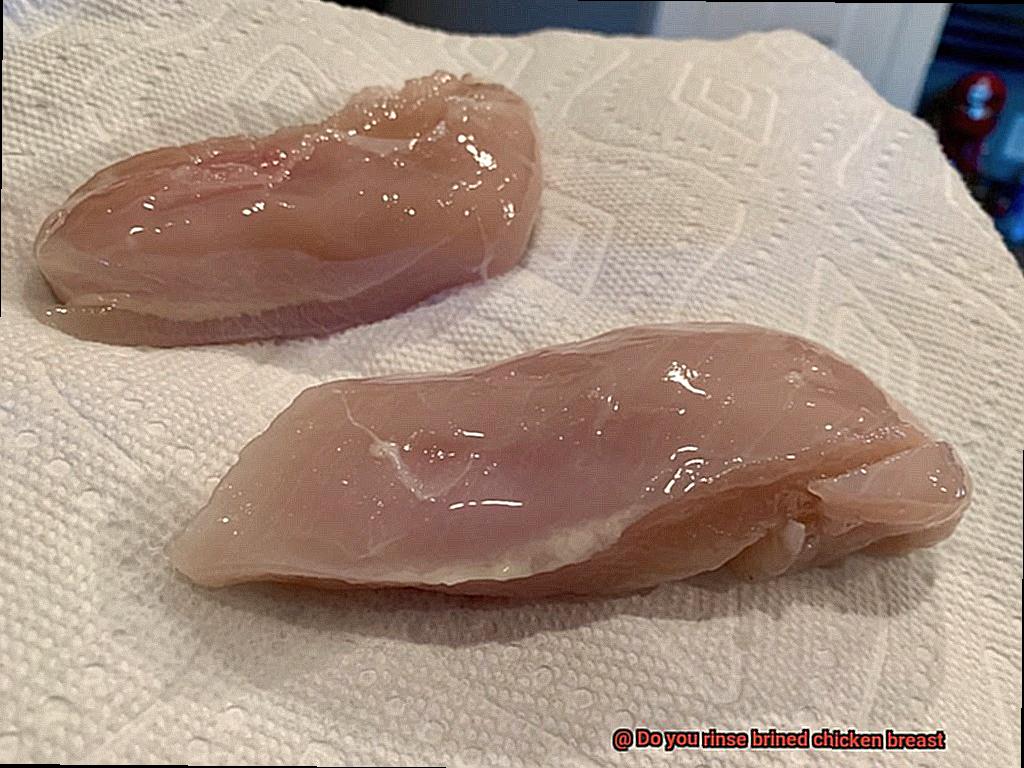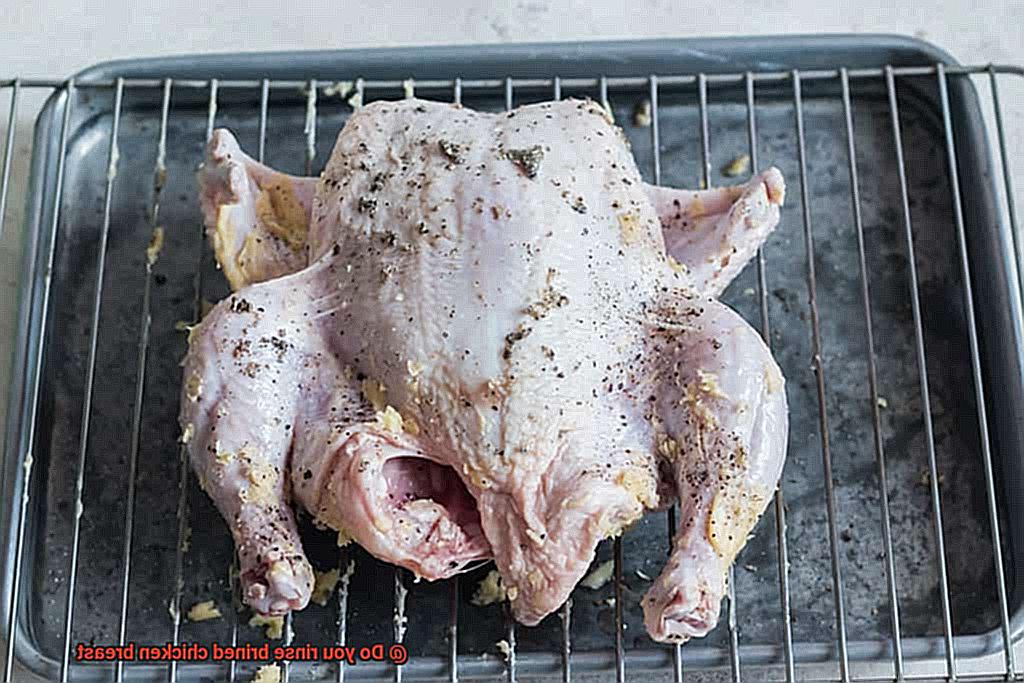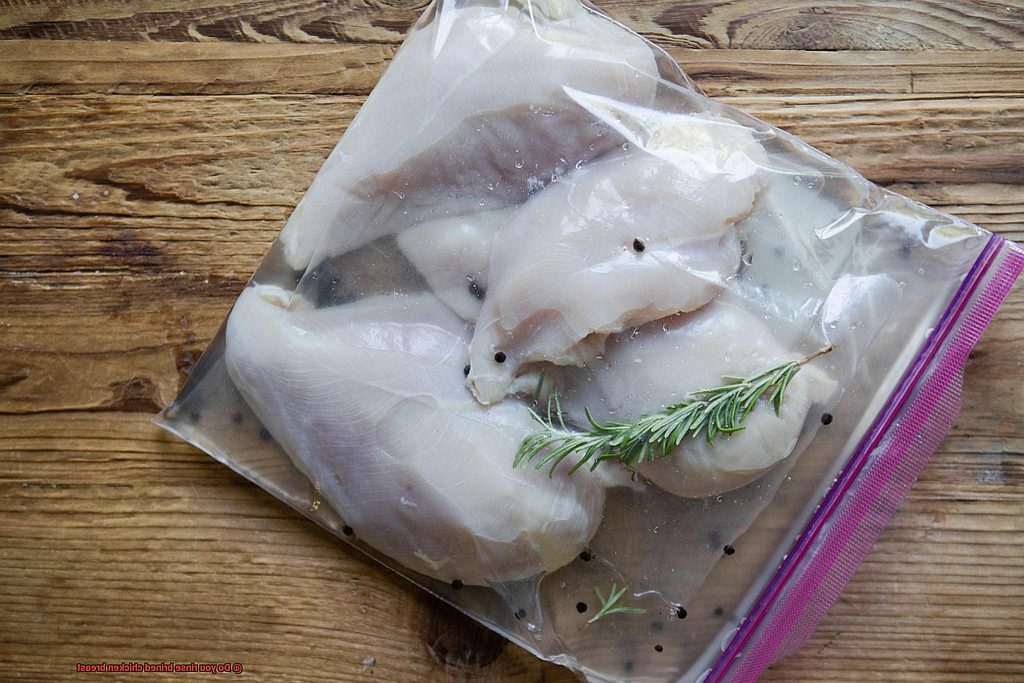Do you consider yourself a chicken aficionado? If so, then you’re probably familiar with the concept of brining chicken breast. Brining is an excellent way to infuse your chicken with flavor and moisture. But once you’ve brined your chicken breast, do you rinse it off before cooking it? This question has sparked countless debates among cooks and foodies alike.
Some argue that rinsing brined chicken breast is crucial to remove any excess salt or other flavorings that may have clung to the surface of the meat. Others believe that rinsing the chicken breast will only dilute the brine solution and wash away all those delicious flavors.
In this blog post, we’ll explore whether or not you should rinse brined chicken breast. We’ll delve into the science behind the brining process, discuss the pros and cons of rinsing, and provide some tips on how to properly brine and cook your chicken breast.
So whether you’re a home cook or a professional chef looking to elevate your poultry game, stick around. We’re going to help unravel the mystery of rinsing brined chicken breast and arm you with all the knowledge necessary to make an informed decision for your cooking needs. Let’s dive in.
Contents
What is Brining?
Brining is the secret to achieving mouth-watering results every time. Brining involves soaking meat in a salt, sugar, and water solution to enhance its taste and texture.
As the meat soaks in the brine, the salt causes it to absorb water which results in a more tender and juicy outcome. Meanwhile, sugar balances out the saltiness and adds a hint of sweetness for a well-rounded taste.
Different types of brines can be used for various meats. For example, a sweet brine may be perfect for pork while a savory one may be ideal for turkey. The time required for brining depends on the strength of the brine and type of meat being used. Chicken breast typically requires at least two hours but no more than eight hours.
Once you have decided on your brine, it’s straightforward to begin. Simply dissolve salt, sugar, and water together before submerging your meat in the solution. However, there is a debate about rinsing the brined meat after soaking. Some argue that rinsing is necessary to remove excess salt from the surface of the meat, while others believe that it removes some of the infused flavors. Ultimately, whether or not to rinse is up to personal preference.
No matter how you decide to prepare your brined meat, it should always be cooked thoroughly until reaching an internal temperature of 165°F for safety reasons.
What are the Benefits of Brining?
This simple process can work wonders in improving the texture, flavor, and overall quality of your meat.

Let’s start with the most obvious benefit: brining helps to keep your meat moist during cooking. By immersing meat in a saltwater solution, the proteins break down and moisture is retained, preventing the meat from drying out. This is particularly useful for lean cuts like chicken breasts, which are prone to becoming dry and tough if overcooked.

But the benefits don’t stop there. Brining also enhances the natural flavor of the meat. As the salt penetrates the meat, it draws out its inherent flavors and tenderizes it at the same time. The brine can also be infused with a variety of other ingredients like herbs, spices, or sugar to introduce even more depth of flavor.
And let’s not forget about how brining can help reduce cooking time. Since the meat has already absorbed some moisture from the brine, it cooks more evenly and quickly than unbrined meat.
Should You Rinse Brined Chicken Breast?
One way to achieve this is through brining. However, once you’ve brined your chicken, the question of rinsing arises. Should you rinse brined chicken breast?
The answer is: it depends. If your recipe specifically instructs you to rinse the chicken after brining, then it’s crucial to do so. This is especially true if you used a high-salt brine, as excess salt can make the chicken too salty to eat. Following your recipe’s instructions will help you achieve the desired result.
However, if your recipe doesn’t mention anything about rinsing the chicken, it’s generally best to leave it as is. Rinsing can wash away the flavors and moisture that were infused during the brining process, resulting in dry and bland chicken. This is particularly true if you used a more complex brine with herbs, spices, and other flavorings.
The type of brine you used is another factor to consider. If you used a simple brine with just salt and water, then rinsing is less necessary as there are no additional flavors or seasonings to wash away. But if you used a more complex brine with various ingredients, then rinsing may remove some of those added flavors.
Pros and Cons of Rinsing Brined Chicken Breast
The answer isn’t a simple one, as there are both benefits and drawbacks to this step. So let’s take a closer look at the pros and cons of rinsing brined chicken breast.
Firstly, rinsing the chicken can be beneficial for those who are watching their sodium intake. This is because it removes any excess salt from the brine, resulting in a lower sodium content in the final product. However, on the other hand, rinsing can also remove some of the flavorful juices that were infused into the meat during the brining process. This can lead to a less juicy and less flavorful end result.
Another pro of rinsing brined chicken is that it helps to remove any leftover herbs or spices that may have stuck to the chicken during the brining process. This can result in a cleaner and more visually appealing final product. However, it’s important to note that rinsing can also increase the risk of cross-contamination in the kitchen if not done properly. Any bacteria present on the raw chicken can spread to other surfaces or foods, making food safety practices crucial when rinsing your chicken.
Ultimately, whether or not to rinse brined chicken breast comes down to personal preference. Some chefs swear by it for a cleaner and less salty end result, while others prefer to leave the flavorful juices intact and skip the rinsing step altogether. It’s important to weigh the pros and cons and make an informed decision based on your own taste preferences and food safety practices.
How to Rinse Brined Chicken Breast Properly
If you want to elevate the flavor and tenderness of your chicken, brining is the way to go. Brining involves soaking the chicken in a saltwater solution to infuse it with flavor and moisture. However, it’s essential to rinse the chicken properly after brining to avoid an overly salty taste. Here are some crucial steps to follow for rinsing brined chicken breast properly:
- Step 1: Remove the chicken from the brine solution and place it in a large colander or strainer.
- Step 2: Rinse the chicken thoroughly under cold running water, using your hands to massage the meat gently. Make sure to wash away any excess salt or other seasonings that may have been absorbed during the brining process.
- Step 3: Rinse both the inside and outside of the chicken, being careful not to damage the meat or remove any of the flavorings that were added during brining.
- Step 4: Pat the chicken dry with paper towels or a clean kitchen towel to remove any excess moisture from the surface of the meat. This will help the chicken brown properly when cooked.
- Step 5: Season the chicken with additional herbs or spices if desired, and cook it thoroughly until it reaches an internal temperature of 165°F for safe consumption.
Alternatives to Rinsing the Chicken
As an expert in the field, I have researched and found some viable alternatives to rinsing brined chicken breast that can result in a succulent and delicious meal.
Firstly, try patting the chicken dry with paper towels after removing it from the brine. This method effectively removes any excess moisture on the surface of the chicken without washing away the brine’s flavor or seasoning. Furthermore, letting the chicken sit at room temperature for 30 minutes before cooking can help it cook more evenly and retain its natural juices.
Secondly, consider using less salt in your brine mixture to begin with, so there is less need for rinsing. Experimenting with different brine recipes and ratios can lead to a perfect balance of flavor and moisture without the need for rinsing. This option allows you to adjust the saltiness level according to your preference.
Lastly, some chefs recommend using a dry brine instead of a wet brine. The dry brine method involves rubbing a mixture of salt and other seasonings directly onto the meat and letting it sit in the refrigerator for several hours before cooking. This technique results in a flavorful and tender chicken without the need for rinsing.
What Happens if You Don’t Rinse Your Brined Chicken?
The answer isn’t as straightforward as you might think.
First off, skipping the rinsing step can result in overly salty or even inedible meat. Since the chicken absorbs a lot of salt from the brine, leaving it unrinsed will lead to a salty taste that overpowers all other flavors. And if that wasn’t bad enough, brining can also make the chicken’s texture rubbery, rendering it unappetizing.
But hold on. Some culinary experts argue that rinsing your chicken after brining will remove all the flavors you worked so hard to infuse into the meat during the brining process. They suggest patting down the chicken with paper towels to remove any excess moisture instead of rinsing it.
So what should you do? Ultimately, it depends on your personal preference and the recipe you’re using. If you like your chicken less salty, rinse it under cool running water for a few minutes before cooking. But if you want to keep all those delicious flavors intact, simply pat down the chicken with paper towels to remove excess moisture.
If you’re feeling adventurous, try experimenting with different methods to see what works best for you. Here are some additional tips:
- If you’re short on time, skip the rinsing step and reduce the brining time instead.
- Use less salt in your brine to avoid an overpowering salty taste.
- Mix up your brine by adding herbs, spices, or citrus zest to infuse different flavors into your chicken.
RxBoYsGwm2g” >
Conclusion
Brining chicken breast is a tried-and-true method to ensure that your poultry is packed with flavor and juiciness. But the age-old question remains: do you rinse off the brine before cooking? The answer, as it turns out, is not so cut and dry.
For starters, it’s important to note that some recipes may specifically call for rinsing after brining. This is especially true if you used a high-salt brine, as excess salt can make your chicken too salty to handle. However, if your recipe doesn’t mention rinsing, it’s generally best to skip this step altogether.
Why? Because rinsing can wash away all of the delicious flavors and moisture that were infused during the brining process. This is particularly true if you used a more complex brine with herbs, spices, and other seasonings. Some chefs swear by rinsing for a cleaner end result, but others argue that it’s simply not worth sacrificing all of that flavor.
If you do need to rinse your chicken for whatever reason, there are proper steps to follow in order to avoid washing away all of those tasty flavors. Patting down the chicken with paper towels after removing it from the brine can effectively remove any excess moisture without compromising on taste or texture.
Ultimately, whether or not to rinse your brined chicken breast comes down to personal preference. If you’re worried about oversalting or just prefer a less intense flavor profile, then go ahead and rinse away. But if you want maximum flavor and juiciness from your poultry, skipping this step might be your best bet.
And don’t forget – there are plenty of other ways to achieve great results without relying on a wet brine.






